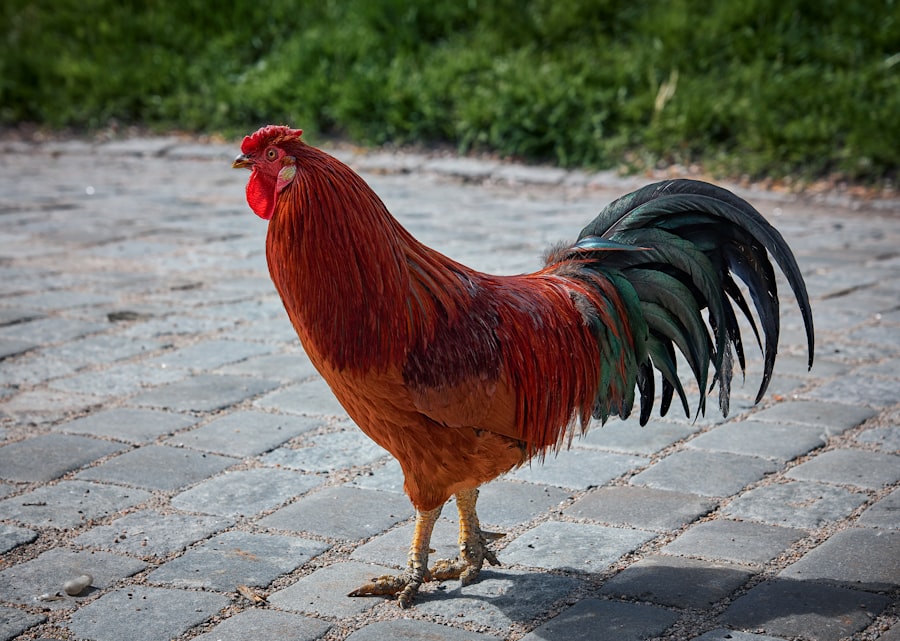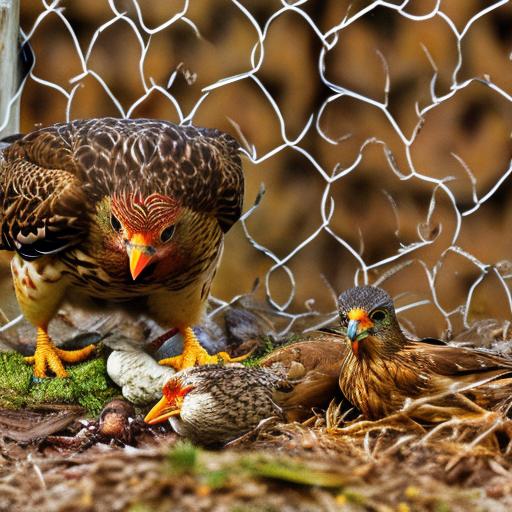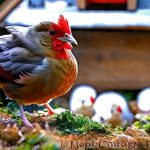Having a chicken coop can be a rewarding experience, providing fresh eggs and the joy of raising your own flock. However, one of the challenges that chicken owners may face is the threat of predators. One such predator that can cause havoc in a chicken coop is the hawk. Hawks are known for their predatory behavior and their natural instinct to hunt small animals. In this article, we will explore the behavior of hawks, how to identify signs of a hawk attack, and provide tips on how to secure the chicken coop to prevent these attacks.
Key Takeaways
- Hawks have a natural instinct to hunt small animals, including chickens in a coop.
- Signs of a hawk attack on chickens include missing or injured birds and scattered feathers.
- Securing a chicken coop with netting or a roof can prevent hawk attacks.
- Deterrent methods such as decoys or scare tactics can also keep hawks away from the coop.
- Providing a safe and secure environment for chickens and monitoring the coop regularly are important to prevent hawk attacks.
Understanding the Behavior of Hawks
Hawks are birds of prey that are known for their keen eyesight and powerful talons. They have a natural instinct to hunt and feed on small animals, including chickens. Hawks are skilled hunters and can swoop down on their prey with great speed and precision. They have sharp beaks and talons that they use to catch and kill their prey.
Hawks may target chickens in a coop for several reasons. Firstly, chickens are relatively easy prey for hawks as they are confined within a small space and cannot escape easily. Secondly, chickens provide a good source of food for hawks, as they are small enough to be carried away by the bird. Lastly, hawks may see the presence of chickens as competition for food and territory, leading them to attack in order to eliminate the perceived threat.
Identifying the Signs of a Hawk Attack
It is important for chicken owners to be able to identify the signs of a hawk attack in order to take appropriate action. Signs of a hawk attack may include missing or injured birds, scattered feathers, or signs of struggle within the coop or surrounding area. Hawks typically target the head or neck area of their prey, so injuries in these areas may indicate a hawk attack.
Another sign of a hawk attack is the presence of talon marks on the chickens’ bodies. Hawks have sharp talons that they use to catch and kill their prey, so finding talon marks on the chickens can be a clear indication of a hawk attack. Additionally, if you notice a hawk circling or perching near the chicken coop, it is likely that it is targeting your chickens.
Securing the Chicken Coop
One of the most effective ways to prevent hawk attacks on your chickens is to secure the chicken coop. There are several measures you can take to make your coop less vulnerable to hawk attacks. Firstly, consider using netting or wire mesh to cover the top of the coop. This will prevent hawks from swooping down and grabbing your chickens.
Another option is to install a roof on your chicken coop. This will provide an extra layer of protection and prevent hawks from accessing your chickens from above. Make sure that the roof is securely attached and does not have any gaps or openings that hawks can exploit.
It is also important to reinforce the sides of the chicken coop. Hawks may try to break through weak spots in the coop, so make sure that all doors, windows, and vents are secure. Consider using hardware cloth or strong wire mesh to reinforce these areas.
Using Deterrents to Keep Hawks Away
In addition to securing the chicken coop, there are several deterrent methods that can be used to keep hawks away. One option is to use decoys or scare tactics. Hawks are territorial birds and may be deterred by the presence of decoys that resemble their own species. You can purchase hawk decoys or even use other bird species as decoys.
Another option is to use scare tactics such as noise makers or reflective objects. Hawks are sensitive to loud noises and bright lights, so using these deterrents can help keep them away from your chickens. Consider using wind chimes, bells, or even shiny objects like CDs or aluminum foil strips to create noise and reflection.
Providing a Safe Haven for Chickens

Creating a safe and secure environment for your chickens is crucial in preventing hawk attacks. Ensure that the chicken coop is well-maintained and free from any potential entry points for hawks. Regularly inspect the coop for any signs of damage or weakness and repair them promptly.
It is also important to provide adequate shelter and hiding spots for your chickens. Hawks are less likely to attack if they cannot easily see or access their prey. Consider adding shrubs, bushes, or other vegetation around the coop to provide cover for your chickens.
Additionally, providing roosting bars or elevated perches inside the coop can help keep chickens safe from ground-based predators, including hawks. Hawks are less likely to attack if they cannot easily reach their prey.
Monitoring the Chicken Coop
Regular monitoring of the chicken coop is essential in identifying any signs of hawk activity. Make it a habit to check on your chickens daily and inspect the coop for any signs of damage or disturbance. Look for feathers, talon marks, or any other signs that may indicate a hawk attack.
If you notice any signs of a hawk attack, take immediate action to secure the coop further and protect your chickens. This may include reinforcing weak spots, adding additional deterrents, or seeking professional help if necessary.
Seeking Professional Help
If hawk attacks persist despite your best efforts, it may be necessary to seek professional help. Contacting a wildlife expert or bird control specialist can provide you with additional guidance and assistance in dealing with hawk attacks. They may be able to offer more advanced deterrent methods or provide advice on how to safely relocate hawks if necessary.
It is important to note that hawks are protected under various laws and regulations, so it is crucial to understand and comply with these regulations when seeking professional help. Killing or harming hawks without proper authorization can result in legal consequences.
Understanding Local Laws and Regulations
Understanding local laws and regulations regarding the protection of hawks and other wildlife is essential for chicken owners. Hawks are protected under various state and federal laws, such as the Migratory Bird Treaty Act in the United States. These laws prohibit the killing, capturing, or harming of hawks without proper permits or authorization.
It is important to familiarize yourself with these laws and regulations to ensure that you are not inadvertently violating them. If you are unsure about the legal requirements, consult with a wildlife expert or local authorities to ensure that you are in compliance.
In conclusion, hawk attacks on chickens in a coop can be a frustrating and potentially devastating problem for chicken owners. Understanding the behavior of hawks, identifying signs of a hawk attack, and taking appropriate measures to secure the chicken coop are crucial in preventing these attacks. Using deterrents, providing a safe haven for chickens, monitoring the coop regularly, seeking professional help if needed, and understanding local laws and regulations are all important steps in protecting your chickens from hawk attacks. By taking these proactive measures, you can create a safe and secure environment for your chickens and minimize the risk of hawk attacks.
If you’re dealing with the frustrating problem of a hawk repeatedly killing your chickens, it’s essential to take steps to protect your flock. One effective solution is to insulate your chicken coop properly. Insulating the coop not only helps regulate temperature but also provides an added layer of security against predators like hawks. To learn more about how to insulate a chicken coop and safeguard your chickens, check out this informative article on PoultryWizard.com. It offers valuable insights and practical tips to ensure the safety and well-being of your feathered friends.
FAQs
What is a hawk?
A hawk is a bird of prey that belongs to the family Accipitridae. They are known for their sharp talons and beaks, which they use to hunt and kill their prey.
Why is a hawk killing chickens?
Hawks are natural predators and they hunt for food. Chickens are a common prey for hawks, especially if they are left unprotected.
How can I protect my chickens from hawks?
You can protect your chickens from hawks by providing them with a secure coop or enclosure. You can also use netting or other barriers to prevent hawks from accessing your chickens.
Is it legal to kill a hawk that is killing my chickens?
No, it is illegal to kill hawks or any other birds of prey. They are protected under the Migratory Bird Treaty Act, which makes it illegal to harm or kill them without a permit.
What should I do if a hawk is killing my chickens?
If a hawk is killing your chickens, you should take steps to protect your flock. This may include providing a secure coop or enclosure, using netting or other barriers, or using scare tactics to deter the hawk. If the problem persists, you may need to contact a wildlife expert for assistance.
Meet Walter, the feathered-friend fanatic of Florida! Nestled in the sunshine state, Walter struts through life with his feathered companions, clucking his way to happiness. With a coop that’s fancier than a five-star hotel, he’s the Don Juan of the chicken world. When he’s not teaching his hens to do the cha-cha, you’ll find him in a heated debate with his prized rooster, Sir Clucks-a-Lot. Walter’s poultry passion is no yolk; he’s the sunny-side-up guy you never knew you needed in your flock of friends!







